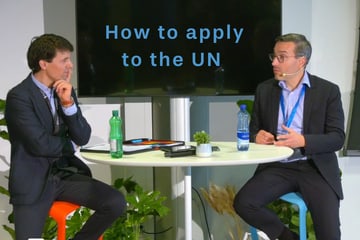On the importance of keywords in UN applications, and more tips on how to get hired by the UN
All who have considered applying to the UN have certainly heard about the fierce competition. We asked an expert to explain how you can make your application stand out and be a success.

Hear it from a UN expert
“The competition is fierce, and we get hundreds and hundreds of applications”, said Jean-Luc Marcelin during his presentation at Forum cinfo 22. Jean-Luc Marcelin, Partnerships and Talent Acquisition Specialist, knows what he is talking about – he has been working for UNDP for over 20 years. Does this mean you should give up the idea of applying? Not at all! He strongly encourages motivated people to apply for jobs and gives some valuable tips to do so effectively that go beyond what you would generally find on the internet.
1. Identify the positions you are a close match for and stick to the requirements
New positions are posted on the UN agencies’ career websites daily. There is a vast potpourri of jobs to apply for. The first challenge in applying is to find a position that matches your experience and skills. Don’t apply to all positions. The key is to dig into the requirements listed in the job description and compare them to what you can bring. Advertised positions at the UN usually distinguish between "required skills and experience" and "desirable skills". There is no getting around the first mandatory requirements. However, it's different with the latter; you don't necessarily have to fulfil all the desirable skills, so not matching them 1:1 shouldn't stop you from applying.
2. No generic applications – they don’t work
Once you have identified which positions could be a match, you must make the UN understand that. How? Show that you know what the position requires and that you meet the required criteria. Put yourself in the role of the recruiter of the respective vacancy you are applying for. Ditch all the generic applications you’ve previously written. Instead, invest your time and energy in tailoring both your CV/P11 and your cover letter to each position.
In all vacancies, you will find keywords. A UN recruiter wants to see those keywords in your application. Therefore, identify and relate them to your CV and application letter. Use the exact keywords in your CV/P11 and motivation letter. These can be technical skills such as project management and data analysis or behavioural competencies such as leadership or relationship management. Ensure all identifiable keywords are included in the job description and requirements. By relating back to these, you can highlight different desirable aspects in your CV/P11. Your application will automatically have the narrative that recruiters seek.
3. Be specific
When preparing your application, make sure to be specific. Make the UN recruiter understand why you are a good fit for THAT position. Many applicants holistically explain everything they have done. Even though you might be an excellent workshop facilitator, that skill is undoubtedly optional in a position where your main tasks involve analytics and research. If you have followed the first tip and are applying for a job that you identify as a match, finding convincing arguments won’t be too big a challenge.
Make sure to use numbers in your application. If you were previously a team leader, did you lead a team of two or 20? If you have experience writing reports, how many and how comprehensive were they? Again, ensure that the listed number is relevant to the job you are applying for.
4. Homework is critical
Through the whole application process, show that you have done your homework. This is indispensable when applying for the UN regarding acronyms, for example. Each agency has different acronyms for projects, structures or positions. Inform yourself on how they are used and in what context within the position you are applying for. Reading activity reports and websites will give you a feeling for the language and terms used.
You can find an overview of the most important UN acronyms here.
5. Prepare for a different kind of interview
At the UN, most of the time, they use a so-called “competency-based interview” (CBI) technique. This is different from interviews in private sector companies. During a CBI, you will be asked to describe a situation that requires you to prove your competency in a certain skill and the results of your actions. These interviews need practice. You can find sample questions from competency-based interviews online. It is advisable to practise answering these in a mock interview with a friend or colleague.



